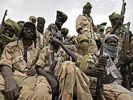
As talks proceed in Doha over peace in Darfur, bombs from government planes continued to fall on the rebel stronghold of Jebel Marra this week.
Rebels in the area reported that 50 civilians died in two days of fighting in the strategic region in central Darfur. The only aid group providing services was forced to suspend operations. The organization, Medecins du Monde, estimated that 100,000 people have been displaced by the fighting, which began in Jebel Marra two weeks ago but intensified in the last few days. A U.N. representative also quoted by AP didn’t venture an estimate, noting "it is simply impossible to know how many people are affected. (…) The entire issue now is how to get access."
The rebel group reporting the attacks, a faction of the Sudan Liberation Army, or SLA, is aligned with influential Darfuri leader Abdel Wahid, who has dismissed the deal making in Doha a “ceremonial peace” and refused to join. Speaking to the Sudan Tribune from Paris, Wahid responded to suggestions that the recent government attack was a ploy to push the rebel group to negotiate. "What is seen as intransigence is actually the demand of Darfurian people who are subjected to the killing, rape and displacement on a daily basis," he said.
Rebel leaders in Doha are very concerned about the violence, Enough’s source at the talks reported. At a minimum, the government attacks call into serious question the commitment by the ruling National Congress Party of President Bashir to the spirit of negotiating “in good faith” as the framework agreements spell out.
Apparently, the government of Sudan is interpreting its ceasefire deal with the Justice and Equality Movement, or JEM, very literally. To date, the government has officially agreed to not exchange fire with JEM. But it seem the government considers the rest of the rebel factions in Darfur fair game. Never mind that a similar framework agreement for a coalition of 10 rebel groups is in its final stages of negotiation.
It has been just one week since JEM and the Sudanese government signed the preliminary deal seen as a breakthrough for the current talks. As we noted in our update from Doha yesterday, it looks likely that a similar framework agreement between the government and a coalition of 10 rebel groups calling themselves the Liberation and Justice Movement will be signed within days, paving the way for a parallel track negotiation to begin next week. But as the surge in violence on the ground in Darfur makes abundantly clear, the process is wracked by many threats and urgently in need of practical arrangements to implement and monitor the deals signed in Doha.

